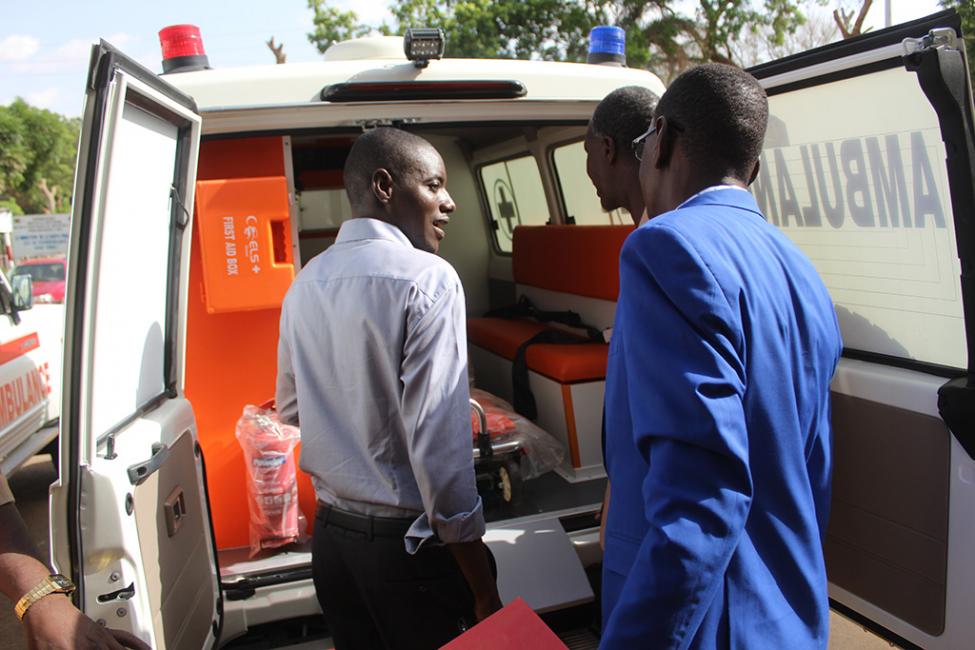-
Who we are
WHO WE AREThe International Organization for Migration (IOM) is part of the United Nations System as the leading inter-governmental organization promoting since 1951 humane and orderly migration for the benefit of all, with 175 member states and a presence in 171 countries.
-
Our Work
Our WorkAs the leading inter-governmental organization promoting since 1951 humane and orderly migration, IOM plays a key role to support the achievement of the 2030 Agenda through different areas of intervention that connect both humanitarian assistance and sustainable development.
What We Do
What We Do
Partnerships
Partnerships
- Where we work
-
Take Action
Take Action
Work with us
Work with us
Get involved
Get involved
- Data and Research
- 2030 Agenda
IOM Strengthens Health Capacities at Niger’s Borders with Libya and Algeria
Niamey – Straddling the migratory crossroads of West and Central Africa, Niger is one of the least developed countries in the world, vulnerable to climatic shocks and regional instability.
As a country of migration transit, Niger faces constant migrant activity at its borders with Libya and Algeria. In August alone, 48,000 individuals were recorded at IOM’s seven Flow Monitoring Points in Niger as transiting throughout the country.
Additionally, water is scarce and precious in Niger’s extreme desert climate. Its absence can lead to epidemics of waterborne diseases such as cholera, typhoid and dysentery.
In order to strengthen Niger’s health capacities, especially at its borders, the International Organization for Migration (IOM) a year ago launched its Immigration and Border Management (IBM) project Strengthening Health Capacities at the Borders with Assamaka and Séguédine.
Assamaka, a city in Agadez region located in northern Niger, regularly sees migrants arriving from across the border in Algeria. To improve the health facilities in Assamaka, IOM’s IBM team in Niger constructed several Water, Sanitation and Hygiene (WASH) infrastructures such as a water tower, latrines and sinks. A borehole connected to the new facilities was built to supply the town with drinking water and medical equipment was provided to Assamaka’s new health centre.
The effort is supported by the Government of Sweden and is aimed at reinforcing the sanitation and healthcare at Niger’s Borders with Libya and Algeria. The project concluded this month.
Throughout, several activities were carried out in both Assamaka, at the border with Algeria, and Séguédine, at the border with Libya, in close collaboration with the relevant national and regional authorities, to the benefit of health authorities, border communities and migrants.
Séguédine, situated in Kawar region, is considered to be one of the main transit points for migrants transiting on their way to or back from Libya. In order to cope with Kawar’s extreme climate, IOM installed solar panels to power the newly built health centre with renewable electricity.
Rescued from the worry of daily power cuts, the health centre now will properly store its medication and vaccines at adequate temperatures. As part of the project’s activities, a water tower was also constructed which will fulfil the town’s current water needs and basic medical equipment and medicine was purchased for the health centre.
“When we are sick, it’s hard to know who to turn to because we lack basic infrastructure,” said Amadou, one of Assamaka’s 1,500 residents. “The lack of proper latrines and drinking water in this hot weather can worsen your health. We now hope that the newly built infrastructures can improve the collective health of our town.”
Given that the road to the closest hospital to Assamaka is three hours away via a sand road, the newly acquired ambulance will now ensure that individuals in need can receive urgent medical assistance. Under the same project, a training for the two ambulance drivers in both Assamaka and Séguédine was conducted by the Direction of Public Health in Agadez.
Additionally, the project strengthened the capacities of 20 Nigerien law enforcement agents operating at the country’s borders, who attended a three-day training on humanitarian border response, which allowed them to acquire basic knowledge and skills on how to properly give medical assistance during a border crisis.
“These newly built infrastructures represent a much-needed addition for both migrants and community members,” said Barbara Rijks, IOM’s Chief of Mission in Niger. “Seeing as many of these people often find themselves stranded in the desert under extreme temperatures, we hope that these improvements will facilitate their recovery and at times, even save lives.”
For more information, please contact Monica Chiriac at IOM Niger, Tel: +227 8931 8764, Email: mchiriac@iom.int
